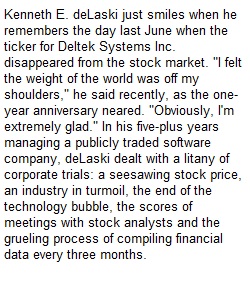


Q MGT 500. Business Basics Assignment 4 One of the driving goals of entrepreneurs is to start up a company, and then take it public through an IPO (initial public offering). It is the prospect of realizing great gains by going public that feeds the venture capital frenzy. During the dot-com glory days, many companies with no revenues – indeed, with no prospect of revenues in the foreseeable future – went public and consequently made their investors very rich. The Washington Post article provided below offers a story of a company that has just “gone private” after being public for a number of years. The story makes it clear that there is nothing automatically good about going public. In fact, for serious businesses, there can be important drawbacks. Read the article carefully, and then bring together your business wisdom to answer the following questions: 1. What was the driving force for Deltek going public in the first place? Was there merit in this logic? 2. What advantages did Deltek find in going public once it became a public company? What disadvantages did it face? 3. What distinguishes Deltek from the dot-com companies that rushed to go public? Why did those companies go public? Who gained? 4. Why did Deltek decide to leave the public arena and become a closely held corporation once again? Do you think its management made the right decision? Your response should be no longer than three pages (single spaced typing).
View Related Questions